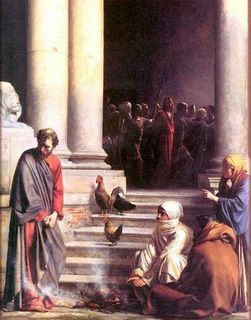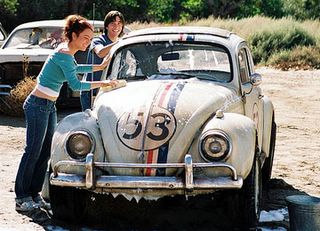
The Name of Aslan
"Aslan is on the move..." said Mr. Beaver.
"They say Aslan is on the move and perhaps has already landed."
And now a very curious thing happened. None of the children knew who Aslan was any more than you do; but the moment the Beaver had spoken these words everyone felt quite different. Perhaps it has sometimes happened to you in a dream that someone says something which you don't understand but in the dream it feels as if it had some enormous meaning -- either a terrifying one which turns the whole dream into a nightmare or else a lovely meaning too lovely to put into words, which makes the dream so beautiful that you remember it all your life and are always wishing you could get into that dream again. It was like now.
At the name of Aslan each one of the children felt something jump inside. Edmund felt a sensation of mysterious horror. Peter felt suddenly brave and adventurous. Susan felt as if some delicious smell or some delightful strain of music had just floated by her. And Lucy got the feeling you have when you wake up in the morning and realize that it is the beginning of the holidays or beginning of summer.
Aslan!
"Is -- is he a man?" asked Lucy.
"Aslan a man!" said Mr. Beaver sternly. "Certainly not. I tell you he is the King of the wood and the son of the great Emperor-Beyond-the-Sea. Don't you know who is the King of Beasts? Aslan is a lion -- the Lion, the great Lion."
"Ooh!" said Susan, "I'd thought he was a man. Is he -- quite safe? I shall feel rather nervous about meeting a lion."
"That you will, dearie, and no mistake,' said Mrs. Beaver, 'if there's anyone who can appear before Aslan without their knees knocking, they're either braver than most or else just silly."
"Then he isn't safe?" said Lucy.
"Safe?" said Mr. Beaver. "Don't you hear what Mrs. Beaver tells you? Who said anything about safe? 'Course he isn't safe. But he's good. He's the King I tell you."
"I'm longing to see him," said Peter, "even if I do feel frightened when it comes to the point."
Edmund sells out to the Witch
But Edmund managed to believe, or to pretend he believed, that [the Witch] wouldn’t do anything very bad to [Peter, Susan, and Lucy], “Because,” he said to himself, “all these people who say nasty things about her are her enemies and probably half of it isn’t true. She was jolly nice to me, anyway, much nicer than they are. I expect she is the rightful Queen really. Anyway, she’ll be better than that awful Aslan!” At least, that was the excuse he made in his own mind for what he was doing. It wasn’t a very good excuse, however, for deep down inside him he really knew that the White Witch was bad and cruel.
The Witch makes her claim
"Have you forgotten the Deep Magic?" asked the Witch.
"Let us say I have forgotten it," answered Aslan gravely. "Tell us of this Deep Magic."
"Tell you?" said the Witch, her voice growing suddenly shriller. "Tell you what is written on that very Table of Stone which stands beside us? Tell you what is written in letters deep as a spear is long on the fire-stones on the Secret Hill? Tell you what is engraved on the scepter of the Emperor-Beyond-the-Sea? You at least know the Magic which the Emperor put into Narnia at the very beginning. You know that every traitor belongs to me as my lawful prey and that for every treachery I have a right to kill.... And so that human creature is mine. His life is forfeit to me. His blood is my property... unless I have blood as the Law says all Narnia will be overturned and perish in fire and water."
"It is very true," said Aslan, "I do not deny it."
The Sacrifice of Aslan
Aslan walks slowly up the hill to the ancient Table, to give himself away. Lucy and Susan watch in horror as he is rushed upon by Ogres with monstrous teeth, and wolves, and bull-headed men …and Cruels and Hags and Incubuses, Wraiths, Horrors, Efreets, Sprites, Orknies, Wooses, and Ettins. They rush him with fury, and bind him in fear…
They began to drag the bound and muzzled Lion to the Stone Table, some pulling, some pushing. He was so huge that even when they got him there it took all their efforts to hoist him on to the surface of it. Then there was more tying and tightening of cords.
"The cowards! The cowards!" sobbed Susan. "Are they still afraid of him, even now?"
They rolled the huge Lion round on his back and tied all his four paws together, shouting and cheering as if they had done something brave, though, had the Lion chosen, one of those paws could have been the death of them all. But he made no noise, even when the enemies, straining and tugging, pulled the cords so tight that they cut into his flesh. Than they began to drag him towards the Stone Table.
“Stop!” said the Witch. “Let him first be shaved.”
Another roar of mean laughter went up from her followers as an ogre with a pair of shears came forward squatted down by Aslan’s head. Snip-snip-snip went the shears and masses of curling gold began to fall to the ground. Then the ogre stood back and the children, watching from their hiding-place, could see the face of Aslan looking all small and different without its mane. The enemies also saw the difference.
“Why, he’s only a great cat after all!” cried one.
“Is that what we were afraid of?” said another.
And they surged round Aslan jeering at him, saying things like “Puss, Puss! Poor Pussy,” and “How many mice have you caught to-day, Cat?” and “Would you like a saucer of milk, Pussumus?”
“Oh, how can they?” said Lucy, tears streaming down her cheeks. “The brutes, the brutes!” for now that the first shock was over the shorn face of Aslan looked to her braver, and more beautiful, and more patient than ever.
“Muzzle him!” said the Witch. And even now, as they worked about his face putting on the muzzle, one bite from his jaws would have cost two or three of them their hands. But he never moved. And this seemed to enrage all that rabble. Everyone was at him now. Those who had been afraid to come near him even after he was bound began to find their courage, and for a few minutes the two girls could not even see him — so thickly was he surrounded by the whole crowd of creatures kicking him, hitting him, spitting on him, jeering at him.
Four Hags, holding four torches, stood at the corners of the Table. The Witch bared her arms...Then she began to whet her knife.
The children did not see the actual moment of the killing. They couldn't bear to look and covered their eyes.
But the Witch’s knife comes down…
And it is night.
As soon as the wood was silent again Susan and Lucy crept out onto the open hill-top. The moon was getting low and thin clouds were passing across her, but still they could see the shape of the great Lion lying dead in his bonds.
Long night.
Desperate night.
Cold night.
Aslan reverses the Curse
The holy dawn…
At that moment they heard from behind them a loud noise—a great cracking, deafening noise as if a giant had broken a giant's plate.... The Stone Table was broken into two pieces by a great crack that ran down it from end to end; and there was no Aslan.
"Who's done it?" cried Susan. "What does it mean? Is it more magic?"
"Yes!" said a great voice from behind their backs. "It is more magic." They looked round. There, shining in the sunrise, larger than they had seen him before, shaking his mane (for it had apparently grown again) stood Aslan himself.
"Oh, Aslan!" cried both the children, staring up at him, almost as much frightened as they were glad....
"But what does it all mean?" asked Susan when they were somewhat calmer.
"It means," said Aslan, "that though the Witch knew the Deep Magic, there is a magic deeper still which she did not know. Her knowledge goes back only to the dawn of time. But if she could have looked a little further back, into the stillness and the darkness before Time dawned, she would have read there a different incantation. She would have known that when a willing victim who had committed no treachery was killed in a traitor's stead, the Table would crack and Death itself would start working backward."
Holy Morning!
Alleluia!
Happy Easter, friends of Aslan!








